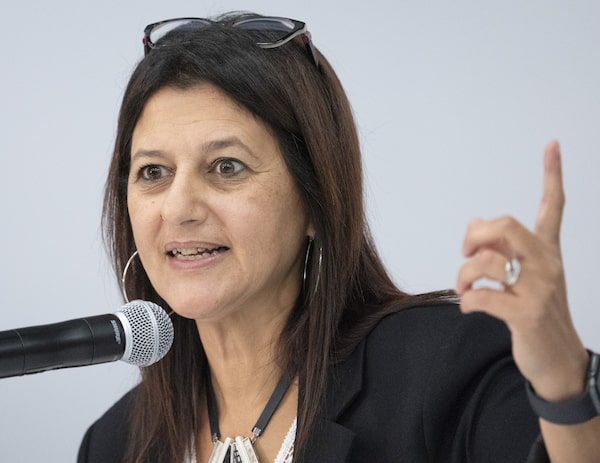
Coroner Géhane Kamel speaks during a news conference in Trois-Rivières, Que., on Oct. 5, 2021.Ryan Remiorz/The Canadian Press
Since coroner Géhane Kamel started her public inquest in March into the effects of the pandemic on Quebec nursing homes, witness after witness has given tearful testimonies about chaotic conditions – overwhelmed health care workers, elderly residents dying in agonizing fashion.
On Tuesday, Ms. Kamel heard an entirely different story. She asked a witness, Sandra Lavoie, how many residents at the long-term care facility Ms. Lavoie managed had contracted COVID-19 during the first weeks of the pandemic.
“It’s zero,” Ms. Lavoie, the co-ordinator at the Montreal Chinese Hospital, replied.
There was a five-second silence. Then Ms. Kamel said she hoped to visit the Chinese Hospital in person one day to have a better appreciation of its success in thwarting the novel coronavirus.
Ms. Kamel is investigating the events that led to the deaths of about 4,000 residents of Quebec long-term care facilities during the first wave of the pandemic in 2020. Her inquest heard this week that Quebec had the highest COVID-19 fatality rate in Canada and one of the highest in the world during the first wave, with most of the deaths occurring among elderly residents of congregate-living facilities.
Quebec long-term care inquest to explore what role government policies played in crisis
Coroner urges Quebec to recognize systemic racism a contributing factor in Joyce Echaquan’s death
During the first wave, personal protective equipment was in short supply and kept under lock and key. Asymptomatic transmission wasn’t recognized and health care workers were restricted to wearing masks only when in proximity to someone with symptoms. Guidance to wear masks at all times wasn’t issued until April.
The inquest heard that in several nursing homes, staffers who showed up with their own face coverings were ordered to remove them, because “everyone would then want to wear masks.”
One exception was the Montreal Chinese Hospital, a 128-bed long-term care centre. Ms. Lavoie explained in her testimony that many of her employees used masks and took more precautions weeks before such steps were mandated by the province.
About two-thirds of the employees are Asian and the hospital has an official bilingual status – French and Chinese – since they care for elderly residents who might have only retained their first language because of dementia.
Ms. Lavoie told the inquest that her workers began worrying about COVID-19 in early January, before other Quebeckers took notice of the new illness. “The anxiety level was rising because the majority of my employees have family or friends in China.”
A number of staffers had also visited Asia for the Lunar New Year, on Jan. 25, 2020. Those who remained in Montreal were reluctant to be paired with someone who had returned from China.
Many had already purchased their own masks, gloves and face shields. “They had it in their garages in case something would happen … I let them wear masks at work and that allowed me to lower their anxieties.”
She noted that her centre had to follow the same budgeting and procurement rules as other nursing homes but, thanks to the workers’ use of their own protective gear, there were no concerns about running out of stock.
Also, before the government put all Quebec nursing homes on lockdown on March 13, families of residents at the Chinese Hospital began in January to limit their visits and also used masks. “We didn’t have different rules. They did it on their own initiative because they were plugged in with what was happening in China,” Ms. Lavoie said.
No Chinese Hospital residents were infected with COVID-19 between March 12 and May 1, the period covered by the inquest’s terms of reference. In total, the facility had four cases in a year and a half.
The first case came on May 6 because a resident was exposed while getting dialysis treatment at the University of Montreal Hospital Centre.
The Chinese Hospital also benefited from other factors. Ms. Lavoie noted that it is located in a spacious, well-ventilated building and has the advantage of a stable, dedicated staff.
“They were also lucky to have a co-ordinator who was alert,” Ms. Kamel said. “The fact that you were open-minded, that you let people have the choice to wear [a mask] or not, I listen to you and I want to thank you.”
Our Morning Update and Evening Update newsletters are written by Globe editors, giving you a concise summary of the day’s most important headlines. Sign up today.